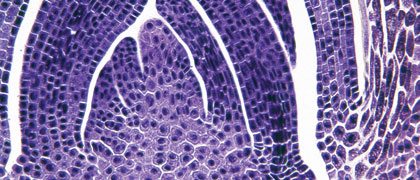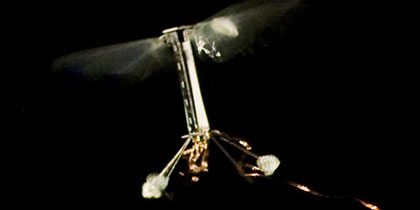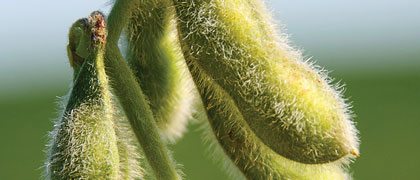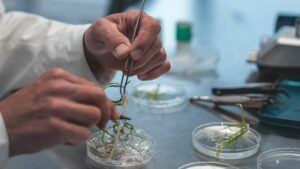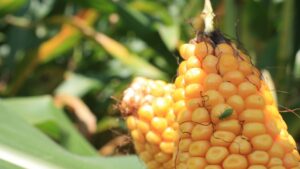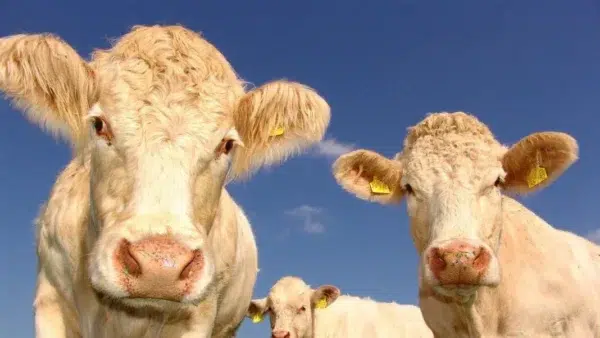This microscopic slide shows the cellular structure of a wheat seed.
The International Wheat Genome Sequencing Consortium published a draft sequence of the bread wheat genome in the journal Science. The draft sequence provides insight into the structure, organization and evolution of the world’s most widely-grown cereal crop. The consortium has established the first reference sequence for the largest chromosome, 3B, which could serve as a template for sequencing the remaining chromosomes. “With the draft gene sequence for each of the bread wheat chromosomes and the first reference sequence of chromosome 3B, we have reached a great milestone in our roadmap,” says Catherine Feuillet, consortium co-chair. “With a chromosome-based full sequence in hand, plant breeders now have high-quality tools at their disposal to speed up breeding programs and identify how genes control complex traits.”
Research carried out by seed physiologists from Wageningen UR and seed experts from the Centre for Genetic Resources in the Netherlands showed that when seeds were stored without oxygen, 98 percent of them germinated after three weeks. In their scientific article published in the online journal Plant Genetic Resources, Wageningen researchers proposed that gene banks package seeds in oxygen-poor conditions after harvest and drying to slow the loss of antioxidants. This means that the seeds can be stored for longer periods of time, reducing regeneration costs. The Centre for Genetic Resources is a Dutch gene bank, which is part of Wageningen UR.
In 10 years, RoboBees will be ready to carry out artificial pollination on food crops.
The Harvard University researchers that created RoboBees are developing the robotic insects with the ability to pollinate crops. Introduced in 2013, the bee-sized robots hover in mid-air when connected to a power source. At the time, the researchers found it impossible to add more weight to the tiny robot without sacrificing its ability to fly. Kevin Ma, Harvard graduate student and mechanical engineer, says that the team is “on the eve of the next big development,” as the robots can now take on more weight while in flight. The team believes that in 10 years, RoboBees will be ready to carry out artificial pollination on food crops.
The National Academy of Sciences’ National Research Council will conduct a two-year study of genetically engineered crops, looking at the development and introduction of genetically engineered crops in the U.S. and globally. Through a broad study of available information, the committee will review the scientific foundation of current environmental and food safety assessments for GE crops and foods. The NRC will assess the reported negative effects of the crops, including the impact on farmers in developing countries and the evolution of so-called ‘super weeds.’ The study will also look at the reported positive effects, including reduced pesticide use and soil conservation through reduced tillage.
The National Science Foundation awarded a team of Arkansas and Missouri scientists a $6-million research grant to combat crop losses resulting from stresses such as drought, poor soil, insects and disease. “Plant stress is arguably the greatest factor limiting global yields of food, fiber and fuel crops,” says Fiona Goggin, a University of Arkansas System entomology professor who serves as a co-principal investigator for the project. “However, plants possess mechanisms to adapt to stress, and these adaptations can be dramatically enhanced through breeding and biotechnology.” The three-year research collaboration between Arkansas and Missouri researchers will develop and apply cutting-edge imaging technologies to help plant scientists select for hardier crops that can fend off insects, diseases and other stresses.
People News

The American Seed Trade Association welcomed Virginia Houston as its associate director of domestic and government affairs. Houston is responsible for assisting with the association’s federal and state legislative and regulatory initiatives.

KWS hired Alexander Drotschmann as head of its corn division. Drotschmann will be located in St. Louis, Missouri, at the new KWS Gateway Research Center and is responsible for corn activities in North and South America. Prior to joining KWS, he worked for Bayer CropScience. In his new role, Drotschmann will become a member of the AgReliant Member’s Committee, a joint venture of KWS and Limagrain for corn breeding, production and sales in North America.
Neal Gutterson joined DuPont Pioneer as vice president of agricultural biotechnology. Previously the president, CEO and board member of Mendel Biotechnology, Gutterson has more than 30 years of experience in plant biotechnology and is a named inventor on more than three-dozen patents and patent-pending applications. “Neal brings extensive biotechnology and business leadership in the seed and crop protection industry to this integral role for DuPont Pioneer,” says Paul Schickler, DuPont Pioneer president.
BioConsortia Inc. expanded its executive team to include Christina Huben as senior vice president of Operations and Administration and Susan Turner as senior vice president of Research and Development. Huben has more than 20 years of business and legal experience, having worked at the New York law firm Whitman Breed Abbott & Morgan, followed by senior roles at EnviroSource, Chemtura Corporation, AgraQuest and Bayer CropScience. Turner joined BioConsortia at its California location. Prior to joining BioConsortia, she was the principal scientist at the company’s New Zealand-based subsidiary.
AgVenture Inc. welcomed Northwest Iowa Ag LLC to its network of seed companies. Based in Moville, Iowa, Northwest Iowa Ag LLC will offer AgVenture brand corn, soybean and alfalfa seed, along with year-round professional seed support services. AgVenture also hired Frank Peterson to serve as western regional business development manager. Peterson worked for a decade in the corporate seed business with Novartis.
La Crosse Seed hired Garrett Knebel as a member of the company’s sales team in northern Indiana, helping customers with their forage, turf and cover crop seed needs. Joe Kelich, the current regional sales manager for Indiana, will continue to work with customers in southern Indiana and Kentucky.
Golden Acres Genetics Ltd. added David Shirk and Justin Comer to the company’s sales team. Shirk’s region includes southwest Kansas, while Comer is responsible for the northwest Kansas corn and sorghum market. Most recently, Shirk was with Syngenta Seeds as a sales representative and Comer was with Taylor Seed Farms.
Arysta LifeScience North America added Clark Johnson to its sales force as territory sales manager. Based out of Pierre, South Dakota, Johnson will be responsible for the South Dakota territory, focusing on the company’s product line of wheat herbicides and fungicides. Previously, he served as a senior sales representative with Dow AgroSciences.
Hoegemeyer Hybrids hired Kevin Krohn as its supply chain coordinator and Kim Mundil as a customer service representative. Krohn will be responsible for tracking Hoegemeyer product inventory throughout the year, while Mundil will work with the company’s dealers and customers to help meet their needs.
Advanta US, a supplier of proprietary agricultural crop genetics and seed, hired Tyson Meador as eastern sales manager. Meador’s territory will include all areas east of the Mississippi River. His primary responsibility will be sales of the Alta Seeds brand of sorghum products and private label seed.
Latham Hi-Tech Seeds added Ken Highness of Dilworth, Minnesota, as a regional sales manager in Northwest Minnesota, which is new ground for the company. Highness’ district is a good fit because it helps Latham narrow the gap between its southern Minnesota territory and its North Dakota territory.
Business News
Monsanto Company and Novozymes highlighted how their BioAg Alliance works to develop innovations for agriculture, boosting productivity and further supporting the management of natural resources on the farm. The alliance is expected to expand the research and commercialization of a new generation of microbials to help farmers meet the world’s demands for food and feed in a sustainable way. This year, the two companies conducted research across 170,000 field trial plots in 70 locations throughout the United States, and they expect to more than double the number of research field plots next season.
Evogene Ltd., a plant genomics company, and Marrone Bio Innovations Inc., a provider of bio-based pest management and plant health products, signed a multiyear collaborative agreement targeting the discovery of novel modes of biological action for insect control, followed by the development and commercialization of new insect control products. Evogene will develop biotechnology insect-resistant seeds, while Marrone Bio Innovations will develop biologically-based insecticides.
Chromatin Inc., an agriculture technology company, acquired Production Seeds Plus Inc., a forage sorghum seed producer and supplier. The assets of Production Seeds Plus more than doubles Chromatin’s storage and seed handling facilities. “This additional operating site, along with its experienced team, will provide important flexibility in producing and managing our seed inventory,” says Tim Wilson, Chromatin’s director of plant operations.
Evogene Ltd, amended its work plan in collaborating with Bayer CropScience LP for improved wheat. Pursuant to the amended work plan, Evogene will shift from discovery of additional genes and SNPs to discovery of novel genomic promoters. “The amendment reflects a growing realization in the industry that the efficacy of a seed trait depends not only on the presence of the gene of interest but also on its optimization with other factors, including how the gene is expressed in the plant,” says Ofer Haviv, Evogene president and CEO. “As part of the amended plan, Evogene is looking to identify promoters that will enhance the probability of success of genes in Bayer’s wheat pipeline.”
Weyerhaeuser Company announced a technology license agreement with DuPont Pioneer that will advance seed technologies. The agreement brings together agricultural and forestry know-how to sustainably improve crop productivity for corn growers. Based on scientific research behind years of Weyerhaeuser NR sustainable forestry, the manufactured seed technology allows for the storage, nourishment, planting and germination of cells capable of growing into a plant. This technology provides a means to cost-effectively regenerate valuable, limited and fragile plant material.
Syngenta Ltd. and Nexgen Plants Pty Ltd. entered into a collaboration to develop resistance in leading crops for three key viruses. The technology is based on the identification of a new class of small plant virus RNA molecules involved in modulating a plant’s defense response to a virus attack. This discovery allows selective breeding from germplasm collections or the introduction of virus-resistance traits into key crops.
Phyllom BioProducts Corp. and Vestaron Corporation entered into a collaboration to develop low-impact biological insect controls. Both companies have novel U.S. Environmental Protection Agency registered active ingredients based on natural proteins. Phyllom’s natural protein is derived from a microbe found in soils and on plants around the world called Bacillus thuringiensis. The companies expect that biopesticides derived from the collaboration will demonstrate performance advantages such as improved crop, plant and animal health, as well as the control of difficult and resistant pests or disease vectors.
Loveland Products, a subsidiary of Agrium, acquired a controlling interest in Agricen, an agricultural biotechnology company. Based in Dallas, Texas, Agricen manufactures two of Loveland Products’ fastest growing plant nutrition brands, Accomplish LM and Titan PBA, which are biologically derived products designed to enhance fertilizer efficiency. Agricen will operate as a Loveland Products subsidiary under its present name. Loveland Products also acquired an interest in Agricen’s sister company, Agricen Sciences, an applied sciences research company developing novel microbial and biochemical solutions for plants.
Barkley Seed Inc. acquired the Desert Durum Wheat Research Program from Monsanto Company. The Desert Durum Program has a long history of producing high-quality, identity-preserved durum wheat seed. “We’re glad to get the program back,” says Michael Edgar, president of Barkley Seed. “We know desert durum very well and believe it will continue to be an important crop in our region.” Originally conducted by an affiliate of Barkley Seed, the Desert Durum Program was sold to Monsanto in 2009.
The National Corn Growers Association’s Corn Board selected Fargo, North Dakota, as the site of the National Agricultural Genotyping Center. This gives growers more influence on research agendas, says Richard Vierling, director of research at NCGA. The new center will translate scientific discoveries, such as the information from the maize genome project, into solutions for production agriculture, food safety, functional foods, bioenergy and national security.
FMC Corporation agreed to acquire Cheminova A/S, a wholly-owned subsidiary of Auriga Industries A/S. “Cheminova’s direct market access in Europe, combined with its strong position in Latin America, will help bring greater balance to our business,” says Pierre Brondeau, FMC Corporation president, CEO and chairman. “Its technology will allow us to expand our position in existing crop segments and provide accelerated access to additional crops, such as cereals.” FMC anticipates achieving synergies through production and operating efficiency gains, as well as improved market access. The acquisition is expected to close in early 2015.
Product News
Valent U.S.A. Corp. launched the Intego Suite System for soybeans, which contains the first novel seed protection fungicide chemistry for pythium and phytophthora registered by the U.S. Environmental Protection Agency in the past 30 years. “This new system protects the entire plant and provides better protection across many species of pythium and phytophthora, resulting in higher yields,” says Todd Mayhew, Valent seed protection product development manager.
Advanta’s Alta Seeds will demonstrate the first herbicide-tolerant sorghum hybrids in its 2014 trials in Hereford, Texas. The first of these sorghum hybrids will be introduced commercially by Alta Seeds in 2016. Herbicide-tolerant grain sorghum, a key crop for areas with limited rainfall, will give growers greater ability to control yield-limiting grassy weeds.
DuPont Pioneer will pilot an expanded version of its Encirca Yield services platform, which includes phosphorous and potassium management. The pilots will field-test and refine the new services, which complement the Encirca Yield Nitrogen Management Service released earlier this year. DuPont Pioneer will sign up a limited group of growers for the new phosphorous and potassium offerings later this year.
Where on the Web
Beck’s Hybrids launched FARMserver, a secure web-based solution developed with the farmer in mind. FARMserver provides a unique recordkeeping system, comprehensive aerial imagery, field-based weather monitoring and a crop scouting app. FARMserver offers farmers access to their information from any web-connected device, at any time.
GENetic Engineering Risk Atlas (GENERA) shows that independent peer-reviewed research on GMOs is common, conducted worldwide and comprises half of the total of all research on risks associated with genetic engineering. GENERA is a searchable database of peer-reviewed scientific studies on the relative risks of GE crops. Journalists, scientists, public officials and anyone else can use GENERA to search for research about the effectiveness of using biotechnology to modify the genetics of plants, and can find studies that compare GMOs to non-GMOs to see if they are equivalent. Studies conducted on the safety of consuming GE foods and their impacts on the environment are also included in the atlas.



